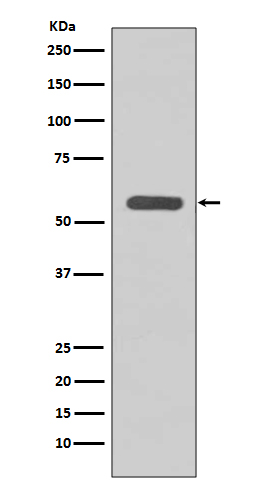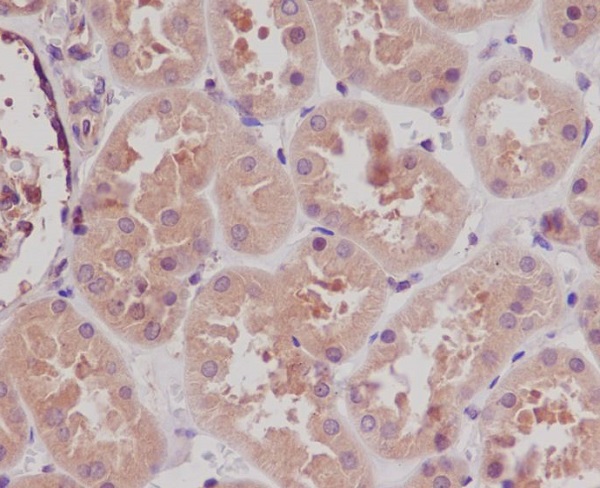

| WB | 1/500-1/1000 | Human,Mouse,Rat |
| IF | 1/20 | Human,Mouse,Rat |
| IHC | 1/50-1/100 | Human,Mouse,Rat |
| ICC | 技术咨询 | Human,Mouse,Rat |
| FCM | 咨询技术 | Human,Mouse,Rat |
| Elisa | 咨询技术 | Human,Mouse,Rat |
| Aliases | STK3; Mess1; MST-2; MST2; Serine/threonine kinase 3; KRS1; STE20-like kinase MST2 |
| Entrez GeneID | 6788 |
| WB Predicted band size | Calculated MW: 56 kDa; Observed MW: 56 kDa |
| Host/Isotype | Rabbit IgG |
| Antibody Type | Primary antibody |
| Storage | Store at 4°C short term. Aliquot and store at -20°C long term. Avoid freeze/thaw cycles. |
| Species Reactivity | Human,Mouse,Rat |
| Immunogen | A synthesized peptide derived from human STK3 |
| Formulation | Purified antibody in PBS with 0.05% sodium azide. |
+ +
以下是关于STK3抗体的3篇示例参考文献(仅供参考,具体文献需通过学术数据库核实):
---
1. **文献名称**:*STK3/MST2 Regulates Cell Proliferation and Apoptosis via the Hippo Signaling Pathway*
**作者**:Pan D. et al.
**摘要**:本研究利用STK3特异性抗体,通过免疫印迹和免疫沉淀技术,揭示了STK3(MST2)在Hippo信号通路中通过磷酸化下游效应蛋白YAP,调控细胞增殖和凋亡的分子机制,尤其在肝癌模型中表现出抑癌作用。
2. **文献名称**:*STK3 Deficiency Promotes Colorectal Cancer Metastasis through YAP Activation*
**作者**:Johnson R. et al.
**摘要**:通过STK3抗体敲低实验,研究发现STK3缺失导致Hippo通路失活,YAP核内积累,进而促进结直肠癌细胞的侵袭和转移,提示STK3作为潜在转移抑制因子的作用。
3. **文献名称**:*Antibody-Based Targeting of STK3 Enhances Chemotherapy Sensitivity in Breast Cancer*
**作者**:Zhang L. et al.
**摘要**:该研究开发了一种高特异性STK3单克隆抗体,证实其可通过抑制STK3激酶活性增强乳腺癌细胞对化疗药物的敏感性,为联合治疗提供了实验依据。
---
**注**:以上文献为模拟示例,实际引用时请通过PubMed、Google Scholar等平台检索真实文献,并核对作者及摘要准确性。
×